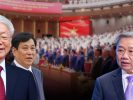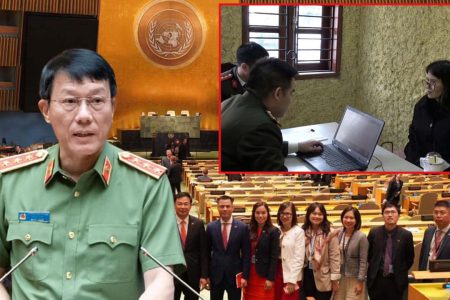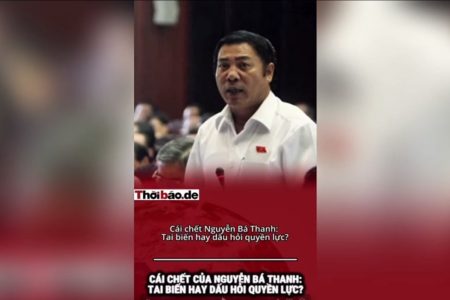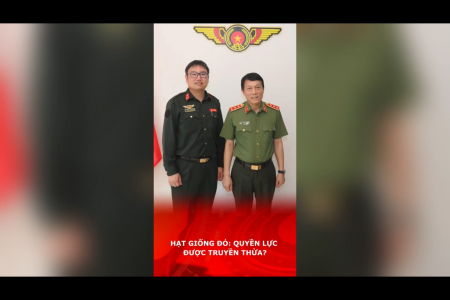
More than a dozen provinces and cities in Vietnam have just announced the establishment of Riot Police Regiments or Battalions in reserve for combat. One of the force’s stated missions is to crack down on people accused of „disturbing public order“ and „illegal demonstrations.“
Unconstitutional
The launching ceremony of the Reserve Riot Combat Police Regiment under the Ho Chi Minh City Police took place on the morning of August 10. State media said this force was established under Decision No. 1984/QD-BCA of the Ministry of Public Security on the establishment of the Regiment, the Reserve Riot Police Battalion of the province-level localities.
The full text of Decision No. 1984 of the Ministry of Public Security has not been made public in the media.
According to the Công an Nhân dân (People’s Police) online newspaper, these regiments, and battalions must be ready to fight in any situation when there is a dispatch order either from the Ministry of Public Security or the directors of the province-level Police Departments.
As of October 10, according to RFA’s summary, at least 15 provinces and cities have launched this force. These localities include Ho Chi Minh City, Binh Duong, Binh Phuoc, Dong Nai, Nghe An, Lao Cai, Bac Giang, Thanh Hoa, and Gia Lai.
The Southeast region such as Ho Chi Minh City, Binh Duong, and Dong Nai is home to many industrial parks, attracting many workers and laborers.
Provinces like Cao Bang and Gia Lai are home to many ethnic minority believers such as the Protestant Ede and Duong Van Minh sect.
Some provinces set up battalions, including Soc Trang, Ninh Thuan, Thai Binh, Phu Tho, Quang Nam, Hoa Binh, etc.
The Ho Chi Minh City Police Department informed the press about a number of detailed tasks listed as “preventing and suppressing cases of public disorder and illegal demonstrations; taking rescue operation; protecting important political events of the Party and State and major holidays; firmly ensuring the political security, social order and safety of the locality, and performing other tasks as required.”
A Ho Chi Minh City-based lawyer who did not wish to be named said the „suppression of unlawful protests“ listed in the duties was unconstitutional. Because, according to this lawyer, protest is the right of Vietnamese citizens, enshrined in the Constitution. Meanwhile, the Law on Protests does not yet exist, so no demonstrations can be listed as illegal.
“I think Vietnam has yet Law on Protests, so it can’t be said that demonstrations are not legal. Furthermore, the right to protest is a constitutional right, so repression is unconstitutional.
The Vietnamese state does not mention the Law on Protests, perhaps because they do not want to, fear that people will protest.”
Ms. Phung, who participated in protests against China’s placement of the HD981 oil rig in Vietnam’s Exclusive Economic Zone in 2014, told RFA that the government has been suspending the bill on Protests for too long.
“According to the Vietnamese Constitution, people have the right to protest, but the bill on demonstrations has been frozen for many years.
Basically, in Vietnam, every protest is suppressed, because they have not passed a bill which would allow people to ask for permission to organize demonstrations like in other countries.”
Article 25 of the 2013 Constitution stipulates that “Citizens have the right to freedom of speech, freedom of the press, access to information, assembly, association, and demonstration. The exercise of these rights is prescribed by law.”
Since 2013, the Government has directed the Ministry of Public Security to assume prime responsibility for, and coordinate with relevant agencies in, developing a draft Law on Protests.
Until 2017, this bill has been repeatedly withdrawn from the National Assembly’s agenda, for further studying and supplementing.
National legislator Truong Trong Nghia from Ho Chi Minh City, in 2017 told the National Assembly that the promulgation of the Law on Protests to implement the 2013 Constitution on ensuring human rights and citizens‘ rights is very necessary.
However, since 2018, no National Assembly member or domestic newspaper has mentioned the bill on Protests anymore.
Strengthen the suppression of resistance
According to Hanoi-based journalist Nguyen Vu Binh, in Vietnam, what the Constitution stipulates is one thing, but its implementation is quite another.
And the establishment of such a specialized agency and force is to quell all resistance efforts among the people, which, according to Mr. Binh, this move follows a series of fierce repressions in the past 4-5 years:
“In the trend of increasing repression in the past 4-5 years, the professionalization of these forces to suppress protests and people’s resistance is normal in my opinion.”
From Ms. Phung’s point of view, the repression and suppression of protests are obvious, always taking place in Vietnam. However, until now, the Ministry of Public Security has only announced the establishment of reserve riot combat police forces, and at the same time publicly one of the tasks is to suppress public order disturbances and protests. Currently, Vietnam does not need to sign any international agreements anymore, so they are not interested in respecting human rights:
“Because Vietnam at this stage does not need to join any treaty or agreement, so they want to deal with whoever they want. Now they are also bolder.
But I believe that even if a force is formed, they will not use uniformed forces to take action to suppress the protesters. Because that will affect the image of the Vietnamese government. They don’t want to show their true face to the world.“
Human Rights Watch’s Report on Human Rights in Vietnam, published in February 2022, assessed that „fundamental civil and political rights are systematically suppressed in Vietnam. The government, under the one-party rule of the Communist Party of Vietnam, tightened its grip on the rights to freedom of expression, freedom of association, peaceful assembly, freedom of movement, and freedom of religion.”
Thoibao.de (Translated)


























